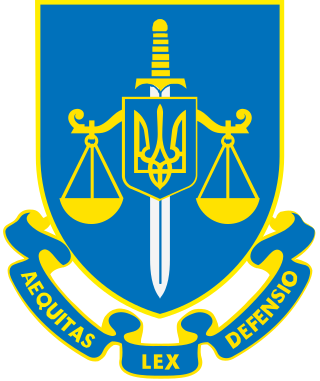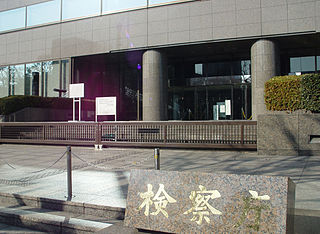
The Institute of National Remembrance – Commission for the Prosecution of Crimes against the Polish Nation is a Polish state research institute in charge of education and archives which also includes two public prosecution service components exercising investigative, prosecution and lustration powers. The IPN was established by the Polish parliament by the Act on the Institute of National Remembrance of 18 December 1998 through reforming and expanding the earlier Main Commission for the Investigation of Crimes against the Polish Nation of 1991, which itself had replaced a body on Nazi crimes established in 1945.
In most common law jurisdictions, the attorney general or attorney-general is the main legal advisor to the government. In some jurisdictions, attorneys general also have executive responsibility for law enforcement, prosecutions or even responsibility for legal affairs generally. In practice, the extent to which the attorney general personally provides legal advice to the government varies between jurisdictions, and even between individual office-holders within the same jurisdiction, often depending on the level and nature of the office-holder's prior legal experience.
The Director of Public Prosecutions (DPP) is the office or official charged with the prosecution of criminal offences in several criminal jurisdictions around the world. The title is used mainly in jurisdictions that are or have been members of the Commonwealth of Nations.

A prosecutor is a legal representative of the prosecution in states with either the common law adversarial system or the civil law inquisitorial system. The prosecution is the legal party responsible for presenting the case in a criminal trial against the defendant, an individual accused of breaking the law. Typically, the prosecutor represents the state or the government in the case brought against the accused person.

The European Public Prosecutor's Office (EPPO) is an independent body of the European Union (EU) with juridical personality, established under the Treaty of Lisbon between 23 of the 27 states of the EU following the method of enhanced cooperation. The EPPO was established as a response to the need for a prosecutorial body to combat crimes affecting the financial interests of the European Union (EU). The idea of establishing the EPPO gained momentum with a legislative proposal put forth by the European Commission in 2013. After lengthy negotiations and discussions within the European Council, the European Parliament and Member States, Regulation (EU) 2017/1939 was adopted on October 12, 2017, formalizing the creation of the EPPO. The EPPO Regulation is the EPPO's legal basis, as it outlines the objectives, structure, jurisdiction, and operational procedures. Directive (EU) 2017/1371, also known as the PIF Directive, specifies the criminal offenses affecting the EU's financial interest falling under the EPPO's jurisdiction. The EPPO's primary mandate is to investigate and prosecute offenses such as fraud, corruption, and money laundering that harm the financial interests of the EU, as defined by the PIF Directive. The EPPO represents a significant step towards a more integrated and effective approach to combating transnational crimes within the EU, fostering collaboration and coordination among member states to protect the Union's financial resources. As an independent EU body, the EPPO plays a crucial role in ensuring the rule of law and safeguarding the integrity of the EU's financial system. The EPPO is based in Kirchberg, Luxembourg City alongside the Court of Justice of the European Union (CJEU) and the European Court of Auditors (ECA).

The prosecutor general of Ukraine heads the system of official prosecution in courts known as the Office of the Prosecutor General. The prosecutor general is appointed and dismissed by the president with consent of the Verkhovna Rada. The prosecutor serves a term of office of six years and may be forced to resign by a vote of no confidence in parliament. The current prosecutor general, since 27 July 2022, is Andriy Kostin.

The judicial system of Turkey is defined by Articles 138 to 160 of the Constitution of Turkey.

The Prosecutor General of Russia heads the system of official prosecution in courts and heads the Office of the Prosecutor General of the Russian Federation. The Prosecutor General remains one of the most powerful component of the Russian judicial system.

The National Anticorruption Directorate, formerly National Anticorruption Prosecution Office, is the Romanian agency tasked with preventing, investigating and prosecuting corruption-related offenses that caused a material damage to the Romanian state. The institution deals with the fight against high corruption offences, which have caused damage greater than €200,000 or if the object of the crime is property or sums of money amounting to over €10,000.

The Constitution of Barbados is the supreme law under which Barbados is governed. The Constitution provides a legal establishment of the Government of Barbados, as well as legal rights and responsibilities of the public and various other government officers. The Constitution which came into force in 1966 was amended in 1974, 1980, 1981, 1985, 1989, 1990, 1992, 1995, 2000, 2002, 2003, 2005, 2007, 2009, 2010, 2018, 2019, 2020 and 2021. The 1966 document succeeds several other documents concerning administration of Barbados. One of them, the Barbados Charter, is discussed in the present Constitution's Preamble. Prior statutes were created for the administration of Barbados as a colony. As a former English and later British colony, the Constitution is similar to those of other former Commonwealth realms, yet distinctly different in the spirit of the Statute of Westminster.

The Ministry of Justice of the Russian Federation is a ministry of the Government of Russia responsible for the legal system and penal system.

Kosovo has a civil law system which is also sometimes known as the Continental European law system. The central source of law that is recognized as authoritative is codifications in a constitution or statute passed by legislature, to amend a code. This system of Kosovo has experienced several changes throughout the years and is currently a system that includes prominent bodies and branches that help Kosovo enact adequate laws and conduct proper legal procedures.
The Judiciary of Kosovo is the collection of the central Kosovo institutions that exercises judicial authority in Kosovo. According to the 2008 Constitution of Kosovo, the judicial system is composed of the Supreme Court and subordinate courts, a Constitutional Court, and an independent prosecutorial institution. The courts are administered by the Kosovo Judicial Council.

State's Attorney Office of the Republic of Croatia is an autonomous and independent judicial body empowered and duty-bound to instigate prosecution of perpetrators of criminal and other penal offences, to initiate legal measures to protect the property of the Republic of Croatia and to apply legal remedies to protect the Croatian Constitution and laws.

The National Council of the Judiciary is the national council of the judiciary of Poland. It is a public body in Poland responsible for nominating judges and reviewing ethical complaints against sitting jurists.
The Amendment to the Act on the Institute of National Remembrance of 2018 is a partly repealed Polish law that criminalized public speech attributing responsibility for the Holocaust to Poland or the Polish nation; the criminal provisions were removed again later that year, after international protests. Article 2a, addressing crimes against "Polish citizens" by "Ukrainian nationalists", also caused controversy. The legislation is part of the historical policy of the Law and Justice party which seeks to present a narrative of ethnic Poles exclusively as victims and heroes. The law was widely seen as an infringement on freedom of expression and on academic freedom, and as a barrier to open discussion on Polish collaborationism, leading to what has been described as "the biggest diplomatic crisis in [Poland's] recent history".

The General's Prosecutor Office of the Republic of Azerbaijan is an agency responsible for managing the criminal investigation and public prosecution in the Republic of Azerbaijan. Although the Azerbaijan constitution nominally guarantees judicial independence, the executive firmly controls prosecutors and judges. Judges and prosecutors collaborate in Azerbaijan to repress political opponents.

The Prosecution Ministry is a constitutional body integrated into the Judiciary of Spain, but with full autonomy. It is entrusted with defending the rule of law, the rights of the citizens, and public interest, as well as watching over the independence of the courts of justice.

The Public Prosecutors Office is the agency for conducting prosecution in Japan. It is an extraordinary organ under the Ministry of Justice. It consists of four tiers of offices: the Supreme Public Prosecutors Office; the High Public Prosecutors Offices (8), the District Public Prosecutors Offices (50); and the Local Public Prosecutors Offices (438).
Part Ten of the Constitution of Albania is the tenth of eighteen parts. Titled The Office of the Prosecutor, it consists of 13 articles. Together with Part Eight (Constitutional Court), and Part Nine (The Courts) underwent radical changes in 2016 during the so-called Justice Reform, which were the efforts of lawmakers to fight corruption, organized crime, nepotism in the justice system.
















